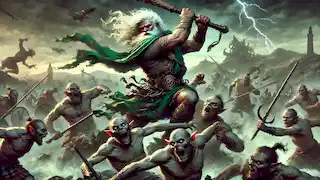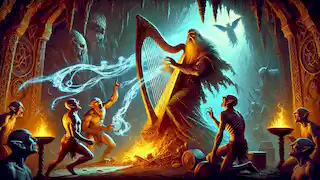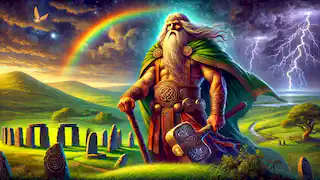Ireland, with its rolling green hills, misty valleys, and ancient stone circles, is a land where myth and reality intertwine. The Tuatha Dé Danann, a race of otherworldly beings, ruled the island in the age before men, and among them, none were as revered—or as complex—as The Dagda. Known as the "Good God," the Dagda was a figure of vast power and immense contradictions. A warrior and a nurturer, a wise leader and a playful trickster, his story reflects the richness of the Celtic spirit, a balance of strength, wisdom, and humor.
This is the story of The Dagda, told in all its sprawling glory, with tales of his heroic feats, his boundless appetite, his sacred treasures, and the love and alliances that shaped a land and its people. Before Ireland was touched by the feet of mortals, it was the battleground of gods. The Tuatha Dé Danann descended upon the land cloaked in clouds of mist, bringing with them knowledge of magic, craftsmanship, and war. They were the children of the goddess Danu, and their power was unmatched. At the forefront of this divine host stood The Dagda, a towering figure of strength and generosity. His laughter could shake the heavens, and his wisdom was sought by all. Among the Tuatha Dé Danann, he was revered as a father figure, a protector, and a guide. The Tuatha Dé Danann brought four treasures to Ireland: the Stone of Fál, the Sword of Nuada, the Spear of Lugh, and The Dagda’s Cauldron. Each symbolized a core aspect of their power, but The Dagda’s cauldron, with its ability to feed all who approached it, embodied his role as the provider and sustainer of his people. The Dagda’s might was legendary, and no symbol of his strength was greater than his club. This massive weapon, so heavy it needed a cart drawn by oxen to carry it, held incredible power. One end of the club could take life with a single blow, while the other could restore it, embodying the duality of destruction and creation that defined the Dagda himself. In one tale, the Dagda used his club during a battle against the Fomorians, the monstrous foes of the Tuatha Dé Danann. A fierce warrior fell, mortally wounded in the chaos. The Dagda, refusing to let death claim one of his people, touched the warrior with the life-giving end of his club. The warrior sprang back to life, his wounds healed, and returned to the fray. This act, repeated in various forms throughout his legend, showed the Dagda’s commitment to his people. But it also hinted at the burden he bore: the power to take life and the responsibility to give it back. The Dagda’s harp, Uaithne, was no ordinary instrument. Crafted from the finest woods and adorned with intricate carvings, it held the power to command the seasons. When he played, his music resonated with the natural world, bringing summer’s warmth or winter’s chill, spring’s renewal or autumn’s harvest. During a raid by the Fomorians, the harp was stolen. This theft was not just a personal affront to the Dagda but a disruption to the balance of nature itself. Furious, he set out with Lugh, the sun god, and Ogma, the champion of strength, to recover it. The trio tracked the Fomorians to a dark and forbidding hall. Inside, the harp was hung on a wall, surrounded by the Fomorians who jeered and celebrated their triumph. The Dagda, undaunted, stepped forward and called to his harp. It leapt from its place, eager to return to its master. As it flew into his hands, the Dagda played three strains of music: the melody of sorrow, which brought tears to the eyes of his enemies; the melody of joy, which made them laugh uncontrollably; and the melody of sleep, which cast them into a deep slumber. With the Fomorians incapacitated, the Dagda and his companions left with the harp, restoring balance to the natural world. The Dagda’s appetite for food and drink was as legendary as his strength. To the Celts, this was not gluttony but a symbol of abundance and prosperity. One of the most famous tales about his appetite occurred during a truce meeting with the Fomorians. The Fomorians, hoping to humiliate the Dagda, prepared a cauldron of porridge so massive that it could feed an entire army. They poured into it milk, meat, and every kind of grain imaginable. The Dagda, undeterred by their mockery, ate the entire cauldron’s contents, scraping it clean with his hands and even licking his fingers afterward. His actions declared not just his strength but his indomitable spirit, showing his enemies that their tricks could not diminish his greatness. {{{_03}}} For all his might, the Dagda was also a figure of passion and love. Among his most famous unions was his relationship with Boann, the goddess of the River Boyne. Despite her being married, their connection was deep and irresistible. Their love gave birth to Aengus, the god of love and youth. To protect Boann’s honor, the Dagda used his magic to halt the sun, making a single day last nine months. In this suspended time, Aengus was conceived, born, and raised, emerging as a fully grown god by the time the day ended. This act was a testament to the Dagda’s wisdom and cunning, as well as his willingness to bend even the laws of nature to protect those he loved. One of the most pivotal moments in the Dagda’s legend came during the Second Battle of Mag Tuired, a climactic clash between the Tuatha Dé Danann and the Fomorians. On the eve of battle, the Dagda encountered the Morrígan, the goddess of war and sovereignty, bathing in a river. Their meeting was one of both strategy and passion, as the Morrígan promised her aid in the coming battle in exchange for his devotion. Their union not only symbolized the alliance of strength and foresight but also ensured the favor of fate. {{{_04}}} During the battle, the Dagda’s presence was pivotal. With his club, he felled countless foes, and with his cauldron, he sustained his warriors. The Tuatha Dé Danann triumphed, driving the Fomorians from Ireland and securing their rule over the land. As the centuries passed, the Tuatha Dé Danann faded into the mists of time, their stories becoming legends. But the Dagda’s legacy endured. His image, larger than life, remains a symbol of balance: the provider and protector, the destroyer and creator, the wise ruler and the joyous reveler. In the hills and rivers of Ireland, his spirit lingers, a reminder of an age when gods walked the land, shaping its destiny with their strength, wisdom, and love.The Arrival of the Tuatha Dé Danann
The Dagda and His Club

The Harp of the Seasons

The Feast of Excess
A God of Love
The Second Battle of Mag Tuired
The Dagda’s Legacy

















